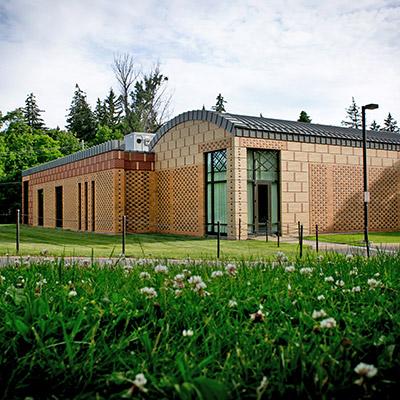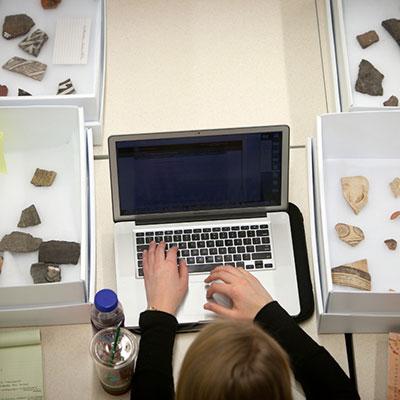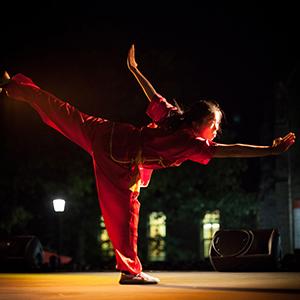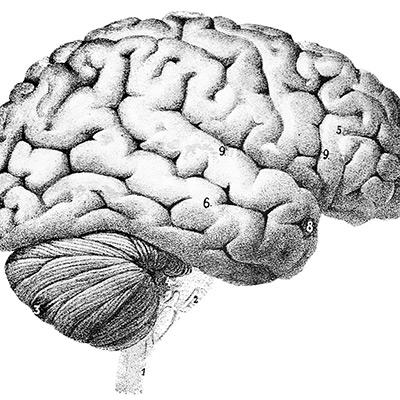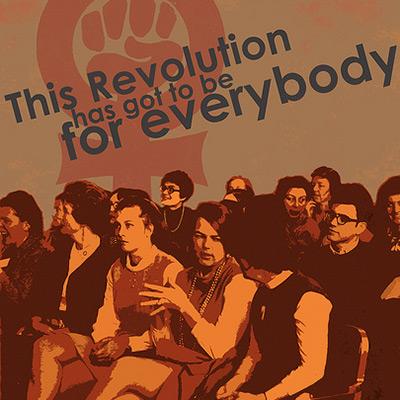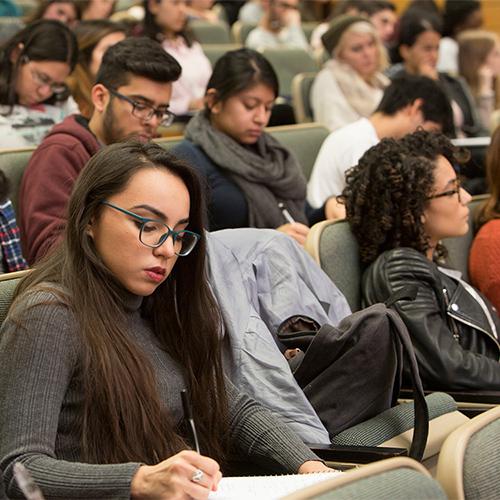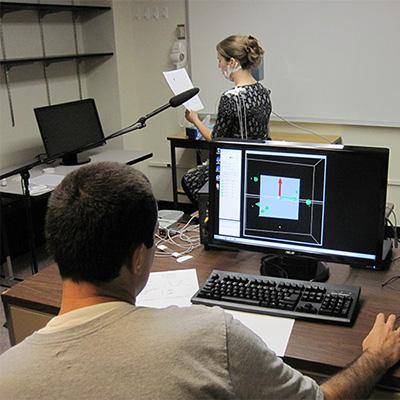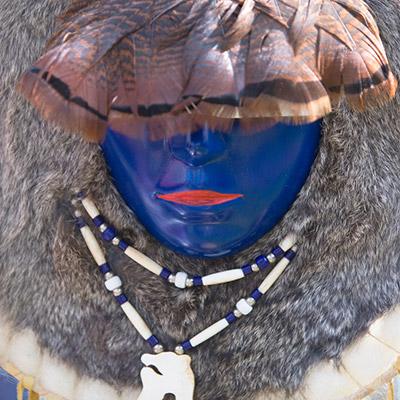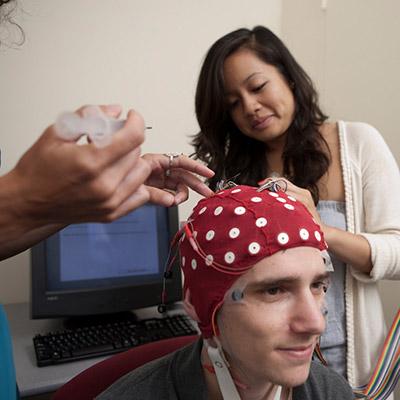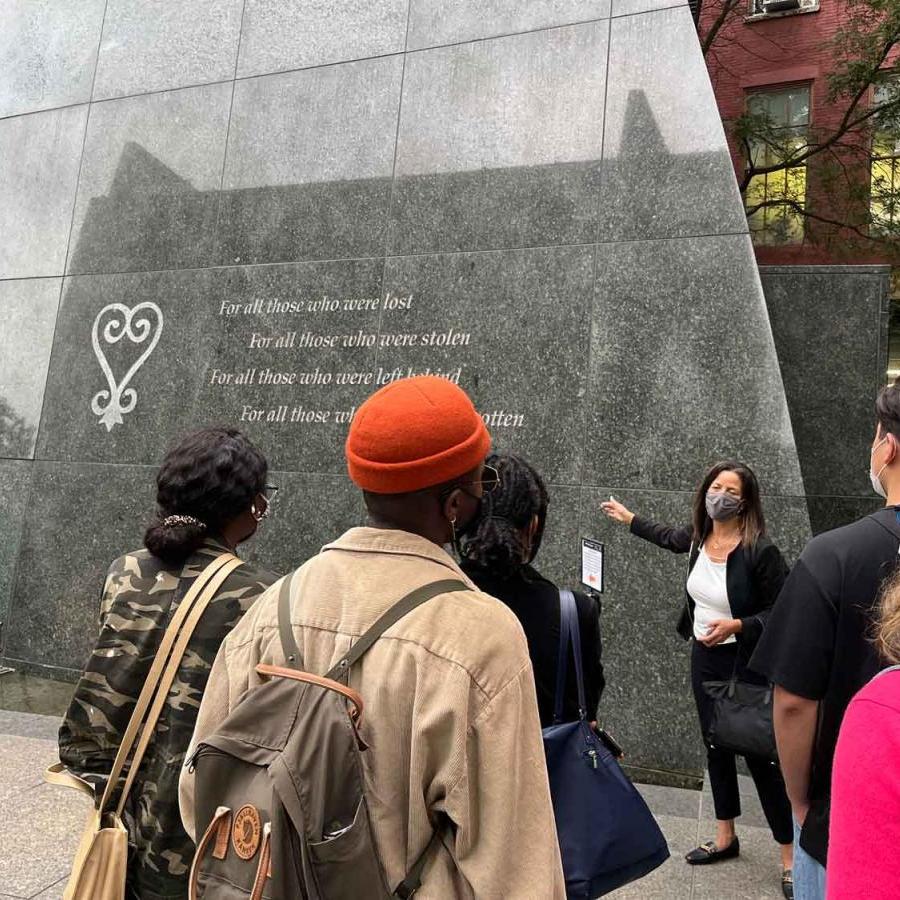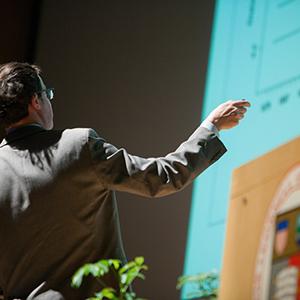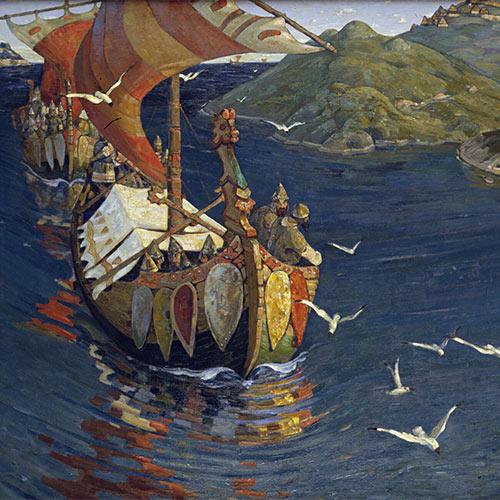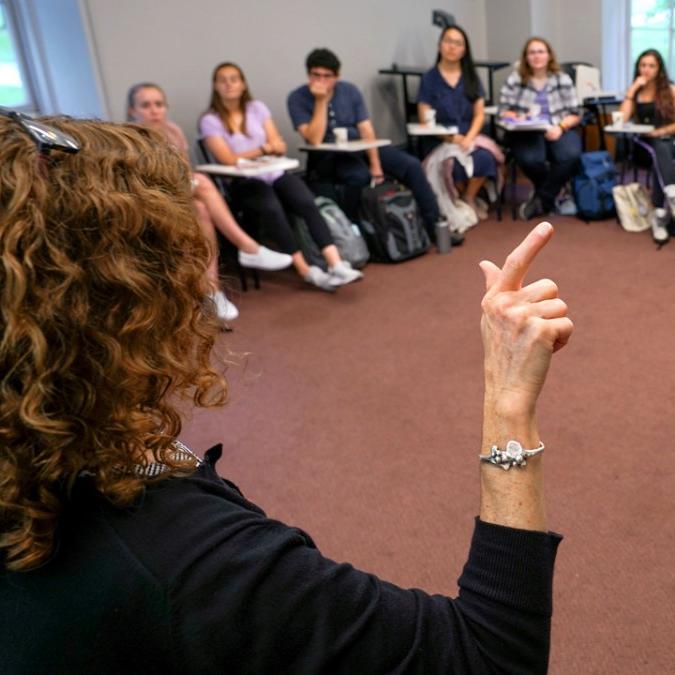
American Sign Language/Deaf Studies
With the American Sign Language (ASL)/Deaf Studies minor, students can pursue an interdisciplinary course sequence focusing on American Sign Language and Deaf culture. Courses offered range across a variety of different disciplines, to provide a broad and compelling perspective on ASL and the Deaf community.
Details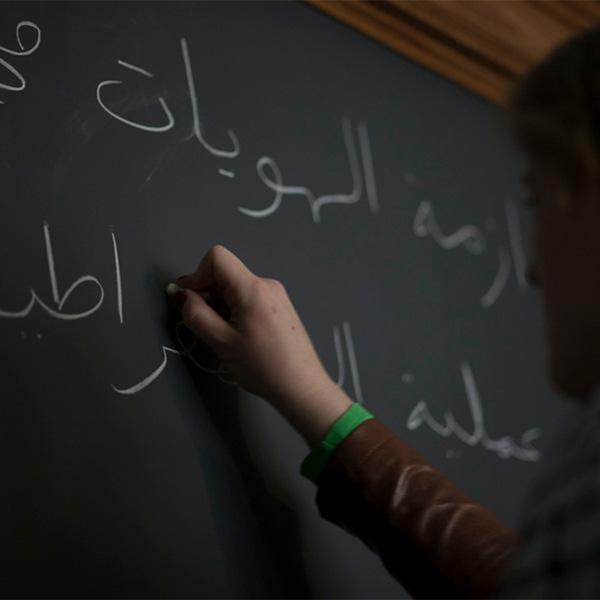
Arabic
The undergraduate minor in Arabic is intended for Cornell students who wish to broaden and deepen their competence in the Arabic language and knowledge of Arab culture. Such linguistic competence and knowledge have helped Cornell students in the past obtain positions in government agencies and think tanks and to enroll in the most competitive Arabic programs in this country.
Details
Astrobiology

Astronomy
As an astronomy major, you’ll gain in-depth knowledge about the nature of the universe, with thorough preparation in physics and mathematics. Like nearly all majors, there are opportunities to engage in research projects in your junior and senior years — faculty and students have played major roles in space exploration, including a heavy involvement in NASA missions such as the Mars Rovers.
Details
Astronomy Data Science
Research in astronomy is making rapidly increasing use of analysis methods that draw from developments in artificial intelligence, machine learning with a strong basis in Bayesian statistics. The overarching questions raised in astronomical science are attractive to students from a wide range of disciplines and can provide the motivation for learning the fundamentals of data science as they are applied to the astronomical domain.
Researchers in the Astronomy Department are involved with specific projects involving large empirical and simulation data sets: spacecraft imaging data from solar system missions, spacecraft survey data for exoplanets, sky surveys at radio, infrared, and optical wavelengths, data sets from gravitational wave detectors, and cosmological simulations of large scale structure in the universe. These data sets will provide attractive contexts for learning and applying modern analysis methods.
Details
Biological Sciences
As a biological sciences major, you’ll have novel opportunities to jump into engaging research projects. With more than 300 faculty, our undergraduate program, jointly run by the College of Arts & Sciences and the College of Agriculture and Life Sciences, is one of the most highly regarded in the country. You can choose a concentration from multiple areas, including animal physiology; biochemistry; computational biology; ecology and evolutionary biology; general biology; genetics, genomics and development; human nutrition; insect biology; marine biology; microbiology; molecular and cell biology; neurobiology and behavior (neuroscience); plant biology; and systematics and biotic diversity.
Details
Caribbean Studies
The interdisciplinary Caribbean Studies Minor (CSM) prepares students to understand the region as a site foundational to modernity that remains essential to understanding the present. Courses offered by this minor are designed to provide students with the analytical framework necessary to understand the sociocultural, economic, and political forces that shape the region as well as how those forces—indigenous dispossession, slavery, capitalism—resonate well beyond the geographical space of the Caribbean. Interdisciplinary by nature, the CSM provides a structured yet flexible array of coursework that cuts across history, culture, and the social sciences. Courses in the arts and humanities draw attention to the historical import of the region; how the Caribbean is constructed across various sites and discourses; and how this construction shapes policy realms and everyday life. Social science perspectives illuminate tools for analyzing cultural heterogeneity; the roles of the state, civil society, and ethnic networks; and the way that Caribbean residents and migrants navigate their transnational realities. Students will be introduced to multiple methodologies and will have the opportunity to pursue research in the Caribbean or Caribbean diasporic communities.
The minor is offered collaboratively with courses from across the university through the Department of History, administered by the Latin American and Caribbean Studies Program. For more information on the minor and a list of approved courses, please see the program site.
Details
Chemistry
As a chemistry major, you’ll learn logical thinking and creative problem solving and can either dive deep following a traditional curriculum or pursue a flexible program that may be ideal for those with alternative career goals. The department’s research areas include inorganic, materials, organic, analytical and physical chemistry, as well as chemical biology.
Details
Classical Civilization
With a minor in classical civilization, you’ll uncover the mysteries of ancient Greece and Rome. You’ll have the choice of any six classics courses (above 1000-level), which chart a coherent path through our offerings in ancient literature (in translation), history, philosophy, art history and archaeology. This minor does not include a language requirement.
Details
Classics
As a Classics major, you can immerse yourself in the cultures of ancient Greece and Rome through four different tracks (Classics, Greek, Latin, Classical Civilization) taking programs in ancient languages, literature, history, archaeology, history of art, science, linguistics and philosophy. Classics majors work closely with individual professors in their areas of expertise, often in small classes, and have many opportunities for independent research and travel. The rigorous analytical training characteristic of a Classics degree helps to develop skills that are valued in a wide variety of careers, as well as giving students a firm foundation for understanding the history of Western culture. With a minor in classics, you’ll conduct your own odyssey through the ancient Mediterranean world by taking any five coherent classics courses (above 1000-level) from one of four different tracks, acquiring proficiency in either Greek or Latin along the way: Classical literature Ancient history (with emphasis on either Greek or Roman) Ancient philosophy Classical art and archaeology
Details
Comparative Literature
As a comparative literature major, you’ll gain a critical and historical perspective on world literature and cultures, with the choice of two tracks. If you want to emphasize literature in your course work, take the comparative literary studies track; if you’re interested in studying literature and theory by integrating rigorous work in film, video or other arts and media, take the literary, visual and media studies track. The major’s broad range of courses provides a critical and historical perspective on world literature and cultures.
Details
Computer Science
As a computer science major, you’ll learn algorithmic ways of thinking and study the elements of computing and information technology such as system design, problem specification, programming, and the modeling, analysis and evaluation of complex systems. You’ll also learn the many applications of computing in science, engineering and business, and have the opportunity to take classes and do research in such areas as artificial intelligence, robotics, computational logic, computer architecture, computer graphics, computer vision, computing systems, databases and digital libraries, machine learning, natural language processing, networks, programming languages and compilation, scientific computing, security and theory of computation.
Details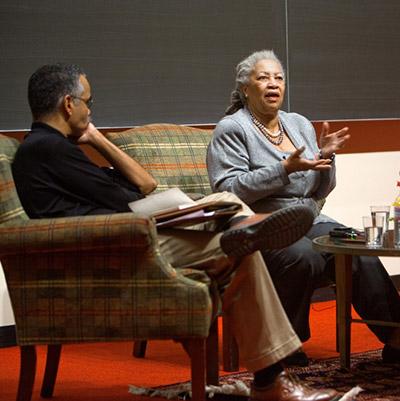
Creative Writing
With a minor in creative writing, you’ll take five courses in creative writing, literature and cultural studies. You can concentrate in a single genre (fiction or poetry), or freely study both.
Click here for more details on the Creative Writing program, including curriculum and requirements.
Details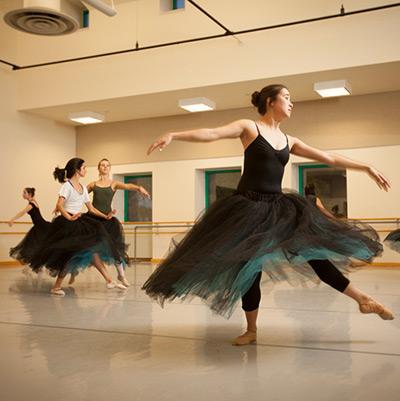
Dance
With a minor in dance, you’ll engage with the fundamental practices of doing, making and thinking about dance. You can take courses that explore choreography and courses that study dance as an historical and cultural behavior, as well as more familiar dance technique courses. Students with a primary interest in dance can incorporate that into the PMA major.
Details
Earth and Atmospheric Sciences
Cornell University's Bachelor of Science in Earth and Atmospheric Sciences equips students to tackle critical global challenges like climate change and natural disasters. The program features small class sizes, dedicated faculty support, and a wide range of electives and extracurricular opportunities. Nestled in the picturesque landscape of upstate New York, Cornell offers an exceptional setting for the study of environmental sciences.
What are the concentrations within Earth and Atmospheric Sciences?
- Climate Science: The climate science curriculum focuses on the scientific study of climate behavior and its practical applications. It addresses critical issues such as how human activities are altering the climate system, the evolving hazards resulting from climate change, and the potential impacts of proposed mitigation strategies.
- Environmental Sciences: Environmental issues often involved complex physical, chemical, and biologic interactions among air, water rocks, and soil, and therefore typically require multidisciplinary approaches to address effectively.
- Geological Science: Geological science explores the processes behind Earth's origin and evolution, its relationship with the solar system, and its internal structure and composition. It also plays a vital role in addressing societal needs, such as the sustainable use of natural resources, environmental preservation, and the study and mitigation of natural hazards like earthquakes, volcanic eruptions, and landslides.
- Ocean Science: Ocean science is a broad field that includes four key subdisciplines: marine geology, marine chemistry, physical oceanography, and biological oceanography. These areas are deeply interconnected, with significant disciplinary overlap. While the concentration in Ocean Sciences covers aspects of all four subdisciplines, it is typically designed to focus more heavily on one area, depending on the student's interests or research goals.
Program Overview:
The EAS program is inherently interdisciplinary, integrating various fields of science and engineering. Relevant engineering disciplines include civil and environmental engineering, biological and environmental engineering, mechanical and aerospace engineering, and electrical and computer engineering. Through this program, students engage in education and research that equips them to pursue competitive careers or advanced study at leading institutions both domestically and internationally. By exploring the complex interactions among the ocean, solid earth, atmosphere, and biosphere, students contribute to addressing society's growing needs for energy, minerals, and clean water, while also playing a role in mitigating the adverse effects of global warming, sea-level rise, natural disasters, and biodiversity loss.
Why is Earth and Atmospheric science important to our world?
Understanding human impacts on our planet provides technologies and solutions for the future. Our graduates will be able to seek careers dealing with energy, mineral and water resources, natural hazards, climate forecasting, and a host of environmental issues through employment in academia, government and the private sector.
For further information about the major:
Director of Undergraduate Studies
Dr. Rowena Lohman
Snee Hall, Room 3210
rbl62@cornell.edu
Undergraduate Coordinator
Annmarie Card
Snee Hall, Room 2102A
ac2666@cornell.edu

East Asian Studies
With a minor in Asian studies, you can focus on East Asia, South Asia or Southeast Asia. Your courses can include the study of language, literature, religion and culture in the Department of Asian Studies, as well as courses on Asian history, politics, anthropology, sociology and economics offered in other departments.
Details
English
The Department of Literatures in English seeks to foster critical analysis and lucid writing. We also strive to teach students to think about the nature of language and to be alert to both the rigors and the pleasures of reading texts of diverse inspiration.
English majors engage with English, American, and Anglophone literature of an astounding historical span and global variety, and are trained to respond to what they read in a rich and complex variety of ways—from expository essays and scholarly inquiries to class discussions and creative writing of their own.
Students develop their own programs of study in consultation with their major advisors. Some focus on a particular historical period or literary genre, or combine sustained work in creative writing with the study of literature. Others pursue interests in such areas as women’s literature, regional literature, literature and the visual arts, or critical theory.
Details
Environment and Sustainability
As an Environment & Sustainability major, you will receive interdisciplinary training in environmental science and studies, developing integrated approaches to address environmental and sustainability issues.
Choose a concentration from one of the following areas
- Environmental Biology & Applied Ecology
- Environmental Economics
- Environmental Humanities
- Environmental Policy & Governance
- Land, Air & Water Resources
- Develop a customized concentration
Cross-university partnerships
The E&S major is offered in collaboration with the College of Agriculture and Life Sciences (CALS), where you can explore additional classes.
Take advantage of resources such as the Arnot Teaching and Research Forest, Cornell Biological Field Station at Shackelton Point, Hubbard Brook Experimental Forest, Cornell Natural Areas and the Shoals Marine Lab.
Details
European Studies
As a European Studies minor, you will have the opportunity to explore Europe’s past, present, and future and to demonstrate a knowledge of European languages, culture, history, politics, and international relations. Through an interdisciplinary curriculum that you can mold to your interests, the minor offers you the chance to take courses across colleges and subjects that exemplify your understanding of a globalizing world, while also providing you with an area of expertise. You will gain invaluable critical thinking skills, language abilities, and helpful frameworks for assessing today’s most pressing issues in Europe and around the world.
This multifaceted minor is provided through the Institute for European Studies at the Mario Einaudi Center for International Studies, and is available to all Cornell undergraduates. Sample Courses: Modern European Politics Introduction to Spanish Urban Design, Architecture, and Art in Renaissance and Baroque Rome German in Business Culture
Details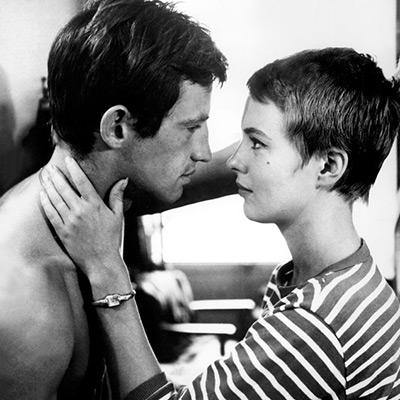
Film
With a minor in film, you’ll gain a fundamental understanding of the formal, industrial, aesthetic and political aspects of cinema and media from the 19th century to the present. You can focus on national cinemas, genres or modes (narrative cinema, for example) or critical issues (such as digital platforms or global media); you may also pursue some work in film and digital media production, including animation and screenwriting. Students with a primary interest in film can incorporate that into the PMA major.
Details
French
As a French major, you’ll have the opportunity to explore in-depth the languages, literatures and cultures of France and the Francophone world. Whether you’re studying Haiti or Montaigne, classical theater or contemporary sexuality, you’ll have the chance to become a flexible and articulate interpreter of texts and ideas. You’ll be encouraged to study abroad and to make connections, wherever you are, across the boundaries of language, discourse, nation and time.
Details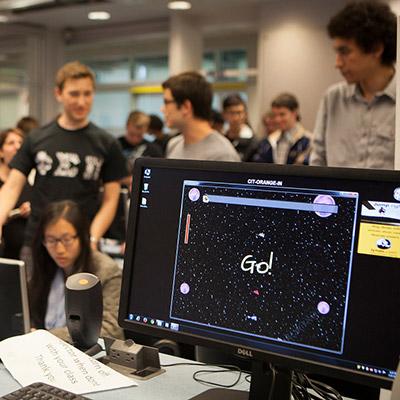
Game Design
With a minor in game design, you can pursue your interest in game design as an extension of your major studies and of your future academic and professional careers. The core of the minor is Intro to Computer Game Architecture, followed by either Advanced Computer Game Architecture or Analytics-driven Game Design, with four additional courses that can range from Graphics and Art, the Psychology of Gaming, to Human-Computer Interaction.
Details
German Studies
As a German studies major, you’ll gain proficiency in reading, speaking and writing German, become acquainted with the culture of German-speaking countries and develop skills in reading, analyzing and discussing German texts in relevant disciplines. Majors pursue individual interests in courses addressing literature and philosophy, culture and society, aesthetics and media, as well as critical and political thought. In consultation with the director of undergraduate studies, courses with a substantial German component from other departments may also be included for the major.
Details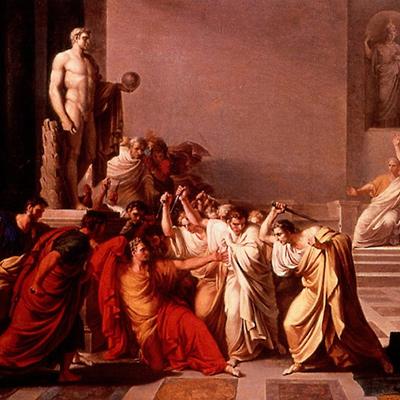
History
As a history major, you’ll be able to take advantage of the department’s particular strengths in ancient, medieval and modern European history; American, Latin American and Asian history; as well as in a unique history of science program. In addition to a wide range of introductory and advanced courses that will help train you in critical thinking, superior organization and good writing skills, you can engage in independent research for credit.
Details
History of Art
Department majors acquire a broad understanding of the history of art in several chronological (ancient to contemporary) and geographical areas: Europe, Africa, North America and Latin America, South and Southeast Asia, China and Japan. Additionally, majors practice a range of art historical methods and interpretive strategies, and are encouraged to locate the history of art within allied humanities fields and the applied arts by taking courses in history, literature, history of architecture, and fine arts. The study of foreign languages, especially as it pertains to study abroad opportunities, is strongly encouraged.
A minor in Visual Studies is another option for undergraduates interested in an interdisciplinary approach to art history.
Details
Italian
As an Italian major, you’ll have the opportunity to explore in-depth the language, literature and culture of that part of the world, only recently united into a single nation, where Dante wrote his Comedy, Saint Francis roamed the Umbrian hills and directors like Pasolini and Fellini redefined the relationship between cinema and realism. You’ll be encouraged to immerse yourself in Italian literary and cultural history and to question many of the stereotypes that continue to circulate, in America but also in Italy, about that very history.
Details
Latin American Studies
With a minor in Latin American studies, you’ll explore issues and topics pertaining to Latin America with courses from various fields of study including music, politics, economics, feminist studies, archeology, theatre, art history, language, literature, architecture, agriculture, science and history.
Details
Mathematics
As a mathematics major, you can focus on the study of the theoretical aspects of mathematics or explore applications to other fields. You can choose one of seven different concentrations and take a rich variety of courses in analysis, algebra, topology, geometry, probability, statistics and logic to tailor a program that meets your individual needs and interests.
Details
Medieval Studies
With a minor in medieval studies, you’ll enhance your enjoyment and understanding of the artistic and material relics of the Middle Ages. You can choose among a wide array of subjects spanning more than a thousand years of languages and cultures—from Old and Middle English literature to Byzantine monuments; from Icelandic sagas to Andalusian architecture; from Chinese intellectual history to Islamic legal history. You can explore how many of our current challenges in the fields of law, human rights, attitudes toward power, authority, gender relations and sexual mores derive from how such issues were formulated a millennium ago.
Details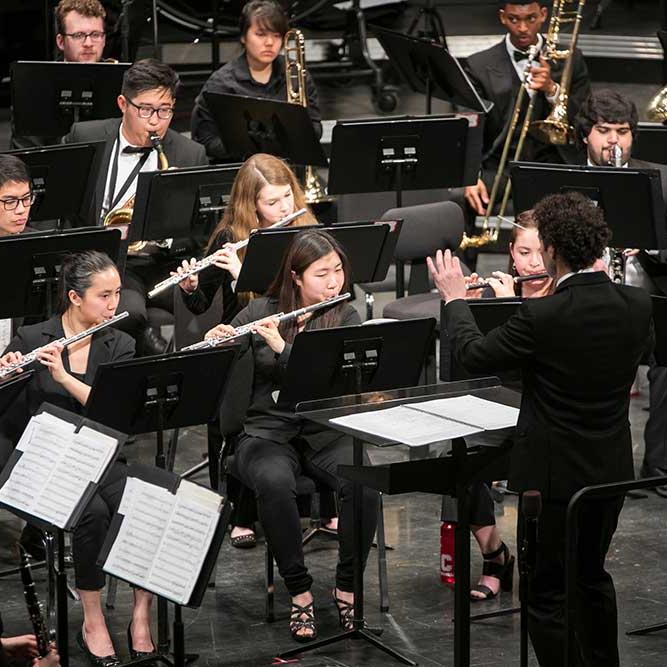
Music
As a music major, you’ll carry the study of music to an advanced level through the integration of performance, history, music theory and composition. Whether oriented toward eventual graduate or professional work in music or a more general approach, you can choose among courses from medieval chant to hip-hop, from classical-era European music to the musics of Latin America and Africa, from electroacoustic music to musical systems from around the globe. We also offer opportunities for performers through individual instruction in piano, violin, voice, percussion and other instruments, as well as through participation in our diverse instrumental ensembles.
Details
Near Eastern Studies
As a Near Eastern studies major, you’ll have the opportunity to acquire language skills as well as familiarity with the history, cultures, literatures and religions of the Near East/Middle East from antiquity to the modern day. You’ll become acquainted broadly with the region – which extends from Turkey east through Iran and Afghanistan, south through the Arabian Pennisula to Yemen and across north Africa from Egypt to Morocco — and its cultures and be able to study a particular subfield in depth. Special focus is given to the ancient east Mediterranean and Mesopotamian regions and to the Levant and Egypt.
Details
Philosophy
As a philosophy major, you can choose among courses in epistemology, metaphysics, history of philosophy, logic, ethics, social and political philosophy, Continental philosophy, philosophy of mind, philosophy of language, aesthetics and philosophy of science. You’ll participate each year in events that range from informal reading groups and workshops to formal conferences and large public lectures by visiting philosophers. The Sage School's small classes and collegial atmosphere support vibrant philosophical exchange among undergraduate and graduate students, faculty and visiting philosophers.
Details
Physics
As a physics major, you’ll develop analytical and problem solving skills while being able to customize your studies. You’ll take a common core set of courses and can then choose a concentration that complements the core, such as physics, or an interdisciplinary concentration such as chemical physics, geophysics, astrophysics, biophysics, applied math, philosophy of science, computer science, etc. The combination of biology/chemistry as a concentration is appropriate if you’re pre-med; you can also create an individualized concentration with courses in physics-related economics, history, law or business.
Details
Portuguese & Brazilian Studies
With a Portuguese and Brazilian studies minor, you’ll gain a linguistic and cultural understanding of Brazil, including recent cultural, political, economic and social trends, as well as familiarity with cinema, music, literature, issues of race, class, and gender, and twentieth-century Brazilian history.
Details
Russian
With a minor in Russian through the Department of Comparative Literature, you can explore Russian language, literature and culture. Translate your interest in politics, books, history or foreign travel (or your Russian heritage) into a broad and satisfying academic program that will introduce you to new ideas and new people across centuries and across campus.
Details
Sanskrit Studies
The Sanskrit Studies minor is intended for students who wish to broaden and deepen their competence in the Sanskrit language and traditional Indian religious, literary, and philosophical culture.
Details
Spanish
As a Spanish major, you’ll have the opportunity to explore in-depth the languages, literatures and cultures of the Spanish-speaking world. You’ll be invited to engage with topics as various as medieval sin and modern film, novels from early modern Spain (most famously, Don Quixote) and from modern Latin America. You’ll also be encouraged to study abroad and to reflect critically upon the diversity that characterizes the Hispanic tradition.
Details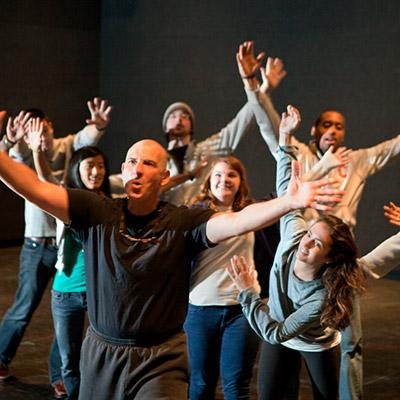
Theatre
With a minor in theatre, you can focus on areas that interest you within the theory and practice of live performance: acting and directing for stage production; theatre history, theory and criticism; and theatre design and technologies. Students with a primary interest in theatre can incorporate that into the PMA major.
Details
Visual Studies
With a visual studies minor, you’ll pursue an interdisciplinary approach to visual art, media (including digital works), performance and perception. You’ll study with faculty from disciplines throughout the college, including history of art, film, literary studies, psychology, theatre and more.
DetailsNo matching items.
We pride ourselves on our offerings, but your curiosity has not been met here yet. Clear all filters.
